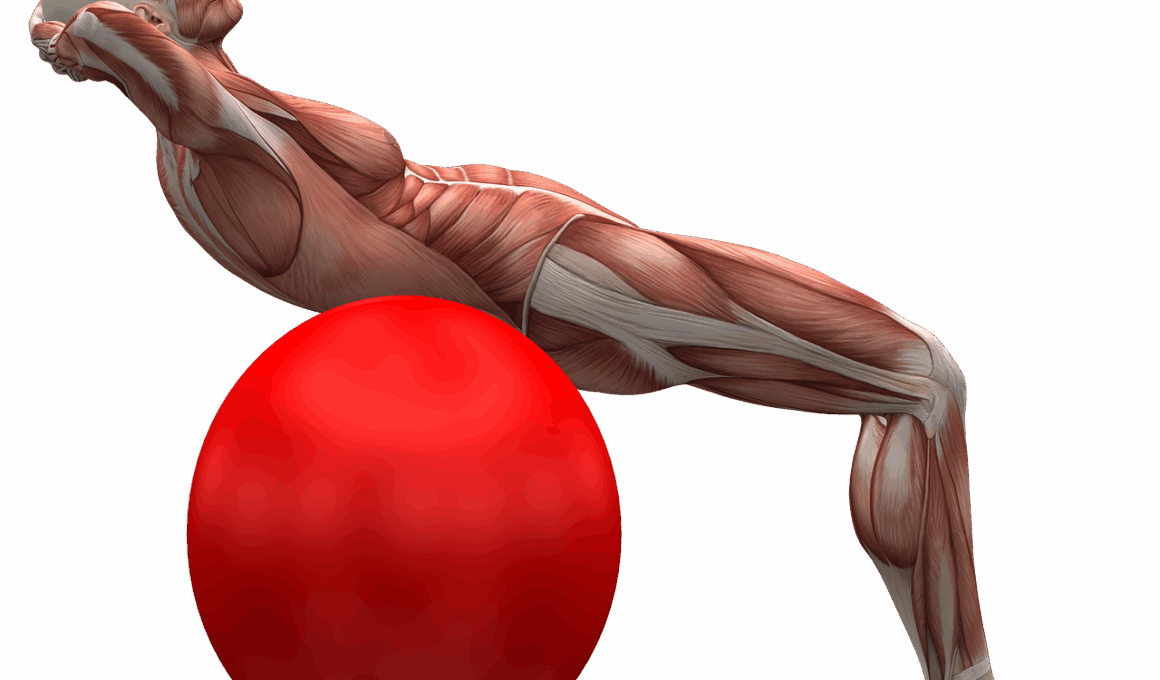How Nutrition Supports Core Muscle Development
Nutrition plays a crucial role in developing core muscles, as it enhances performance and recovery. For athletes and fitness enthusiasts, understanding core stability is vital since it influences overall strength. A balanced diet rich in macronutrients provides the necessary energy for intense training sessions. Carbohydrates serve as the primary fuel source, allowing athletes to sustain long workouts. Protein is essential for muscle repair and growth, promoting the synthesis of new muscle fibers. Healthy fats also contribute to overall energy levels and support cellular function. Adequate hydration is important; it ensures optimal physiological processes, including digestion and nutrient absorption. Micronutrients such as vitamins and minerals play a supportive role in muscle function. They help reduce inflammation and promote a quicker recovery after exertion. Antioxidants found in fruits and vegetables can combat oxidative stress resulting from strenuous activity. Therefore, adhering to a nutritious regimen tailored to individual needs and activity levels is fundamental. Incorporating whole foods into daily meals typically yields better results than relying on supplements. Overall, intentional meal planning significantly affects an athlete’s capacity to develop and maintain core strength effectively.
The timing of nutritional intake is equally crucial in supporting core muscle development. Consuming the right nutrients at the right times optimizes performance and recovery. For instance, before workouts, athletes should focus on carbohydrates to provide immediate energy. A meal rich in slow-digesting carbs, like oats or whole grains, can fuel prolonged training sessions. Protein intake post-exercise is vital for muscle recovery. High-quality protein sources such as lean meat, fish, or plant-based options should be consumed within 30 minutes to two hours after working out. This timing helps to maximize muscle protein synthesis, ensuring muscles recover efficiently. Meal preps and snack ideas can facilitate better nutritional patterns. For example, having protein bars or smoothies ready for post-workout recovery can be beneficial for busy athletes. Additionally, maintaining consistent meal intervals helps keep energy levels stable throughout the day. This can prevent fatigue and optimize performance during training. Overall, understanding the timing of nutrition can highly impact core stability and muscle development, emphasizing that intentional and informed choices lead to better physical outcomes.
Essential Nutrients for Core Muscle Growth
When discussing nutrition and core muscle development, specific nutrients must be emphasized. First, protein is vital; it provides the building blocks necessary for muscle tissue repair and development. Amino acids, the components of protein, are particularly crucial for recovery after strenuous activity. Common protein sources such as chicken, fish, beans, and tofu contribute to daily needs. Additionally, carbohydrates replenish glycogen stores depleting during exercise. Whole grains, fruits, and starchy vegetables serve as excellent carbohydrate sources. Consuming these foods can enhance endurance, allowing athletes to perform at their best. Furthermore, healthy fats, obtained from sources like avocados, nuts, and olive oil, support hormone production and overall health. Omega-3 fatty acids, in particular, can reduce muscle soreness and inflammation post-workout. Vitamins and minerals also play a role; for instance, vitamin D is essential for calcium absorption, which is critical for proper muscle contractions. Iron helps oxygen transportation within the body, ensuring that muscles receive sufficient oxygen during workouts. A balanced approach that incorporates all these nutrients is necessary for optimal core development.
Another important aspect of proper nutrition for core stability is the role of fiber in the diet. High-fiber foods can contribute to weight management, which is important for athletes, as body composition plays a crucial role in performance. Foods such as fruits, vegetables, whole grains, nuts, and seeds not only provide fiber but also contain essential vitamins and minerals. These nutrients help to support an athlete’s overall health and energy levels. Additionally, a diet rich in fiber supports digestive health. A healthy digestive system allows for better nutrient absorption, ensuring that muscles receive the necessary vitamins and minerals to thrive. It can also help prevent spikes and dips in energy, contributing to improved performance during training. Staying full longer can assist athletes in sticking to their nutrition goals, avoiding processed foods high in sugar and unhealthy fats. So, opting for a high-fiber diet indirectly affects core muscle endurance and overall performance. Therefore, integrating fiber-rich foods into daily meals should not be overlooked in the context of core stability and effective muscle development.
Meal Planning for Enthusiasts
For athletes and fitness enthusiasts, effective meal planning can significantly enhance core stability and performance. Creating a month’s worth of meal ideas can help ensure a balanced diet. Planning meals eliminates the stress of last-minute cooking, which often leads to unhealthy food choices. It allows for the inclusion of a variety of nutrients, ensuring optimal energy levels and recovery support. Breakfast choices might include oatmeal topped with fruits and nuts, providing a balance of carbohydrates, fiber, and healthy fats. Lunch could feature grilled chicken salads or whole grain wraps filled with lean proteins and abundant vegetables. For dinner, athletes can explore options like quinoa and roasted veggies, offering essential nutrients for muscle repair. Preparing healthy snacks such as protein-packed smoothies or energy balls can prevent unhealthy cravings between meals. Grocery shopping should focus on whole foods, minimizing processed items. Staying well-prepared also includes hydration; infusing water with fruits can encourage adequate fluid intake. This thoughtful approach ultimately fosters better compliance with nutrition guidelines for core muscle development and overall sports performance.
The importance of supplements in nutrition, particularly for core muscle development, should also be addressed. While whole foods should be the priority, dietary supplements can be beneficial in certain situations. For example, protein powders can aid those struggling to meet their protein requirements through food alone. Post-workout recovery shakes can provide an easy and effective solution to replenish lost nutrients. Omega-3 fatty acids may be obtained from fish oil supplements, beneficial for their anti-inflammatory properties. However, athletes should be cautious—not all supplements are created equal. Consulting with a nutritionist or healthcare provider can help ensure the right choices are made. Moreover, understanding that supplements should not replace whole foods is vital. Their role is to complement a healthy diet. Additionally, whole food sources offer a broader range of nutrients, promoting overall health. It is vital to approach supplementation with care, emphasizing the significance of a solid nutritional base. Ultimately, supplements can play an auxiliary role but should never overshadow the essence of a balanced, nutrient-rich diet tailored to an athlete’s specific needs.
Conclusion
In conclusion, nutrition significantly impacts core muscle development and overall athletic performance. A balanced diet consisting of adequate protein, carbohydrates, healthy fats, vitamins, and minerals lays the foundation for strength and stability. Proper meal timing enhances performance and recovery, while high-fiber foods contribute to weight management and digestion. Meal planning assists athletes in maintaining their nutritional goals, promoting healthier choices. Likewise, understanding the role of supplements can further benefit those who may need additional support in their diets. Ultimately, combining these aspects encourages not only core stability but also fosters a comprehensive approach to athletic training and performance. Nutrition should be viewed as an integral part of any fitness program, especially for core development. An intentional focus on diet encourages athletes to optimize their training efforts. Moreover, a strong core enhances overall functional movement, reducing injury risk and increasing athletic efficiency. Following a structured nutritional plan encourages accountability and awareness, leading to long-term health benefits. Athletes must prioritize their nutrition as much as their training for optimal results and performance longevity.
This is a summary of key points discussed throughout the article on core muscle development and the role of nutrition. Emphasizing the various aspects of nutrition including macronutrients, meal timing, and supplementation will equip athletes and fitness enthusiasts to make informed dietary choices. Overall, adopting a comprehensive nutritional strategy can yield significant benefits in core strength, stability, and performance.


